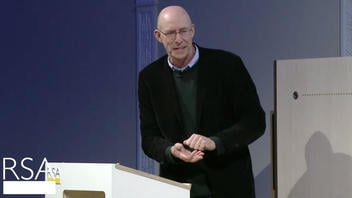
Does McDonald's use a toxic insecticide named Methamidophos, or Monitor, on the potatoes used for fries? No, that's not true: A spokesman for Lamb Weston, one of McDonald's primary potato suppliers, denied the claim to Lead Stories. Use of Monitor in the United States was "voluntarily cancelled" in 2009.
The claim about McDonald's fries appeared in a video on YouTube (archived here) on September 4, 2013, under the title "
If you go to McDonald's, anywhere in the world, you will find french fries.
Click below to watch the video on YouTube:
(Source: YouTube screenshot taken on Fri Nov 11 15:22:29 2022 UTC)
Pollan claimed that, to remove blemishes from the Russet Burbank potatoes McDonald's wants, blemish-free, for its french fries, potato farmers have to get rid of aphids, an insect. He alleged that, to do so, they use an insecticide called Methamidophos, or Monitor. Pollan claimed that this chemical is so harmful that farmers don't go into affected fields for five days after spraying the potatoes. The potatoes, he asserted, are shipped off to be made into McDonald's fries after spending six weeks in "atmosphere-controlled sheds," the size of a football stadium, to "off-gas."
Pollan did not cite a source that proves the accuracy of this information.
A spokesperson for Lamb Weston, the food-processing company that oversees farmland in Washington state that supplies potatoes to McDonald's, denied the claim. In an email to Lead Stories on November 11, 2022, Lamb Weston spokesperson Shelby Stoolman wrote:
Lamb Weston can confirm that our growers do not use the pesticide you reference, "Monitor", as it contains the active substance Methamidophos which, as you note, was de-registered by the U.S. EPA in the United States in 2009 and is banned for use on potatoes.
Lead Stories contacted McDonald's for commentary about Pollan's claim, but did not receive a response. We will update this fact check as appropriate if a response is received.
The Centers of Disease and Control and Prevention defines Methamidophos as "an organophosphate insecticide" that was used mostly on commercial crops of potatoes, cotton and tomatoes. All voluntary uses of the insecticide were cancelled in 2009, according to the CDC's National Biomonitoring Program.
In an November 11, 2022, email to Lead Stories, Hans Plugge, a principal, or co-owner, at Safer Chemicals Analytics LLC, a Columbia, Maryland firm that provides consulting services about chemicals, told Lead Stories that the claim was likely a "massive overinterpretation." Plugge noted an archived page from the Environmental Protection Agency (EPA) from 2002 about Methamidophos.
Rather than the five days mentioned by Pollan, the EPA webpage states the insecticide has a Restricted Entry Interval of four days when applied to potatoes. A Restricted Entry Interval is the time immediately after a pesticide is applied when entry into the treated area is restricted.
The EPA does not mention moving the potatoes into an "atmosphere-controlled shed" and does not warn that the potatoes are inedible after those four days.
The Food and Drug Administration (FDA) regularly monitors pesticides and pesticide residues that are used on the fruits and vegetables consumers buy. Its database of recalls, market withdrawals and safety alerts includes no mention of the Russet Burbank potatoes used for McDonald's french fries.
Additional Lead Stories fact checks of claims about pesticides can be found here, here and here.














